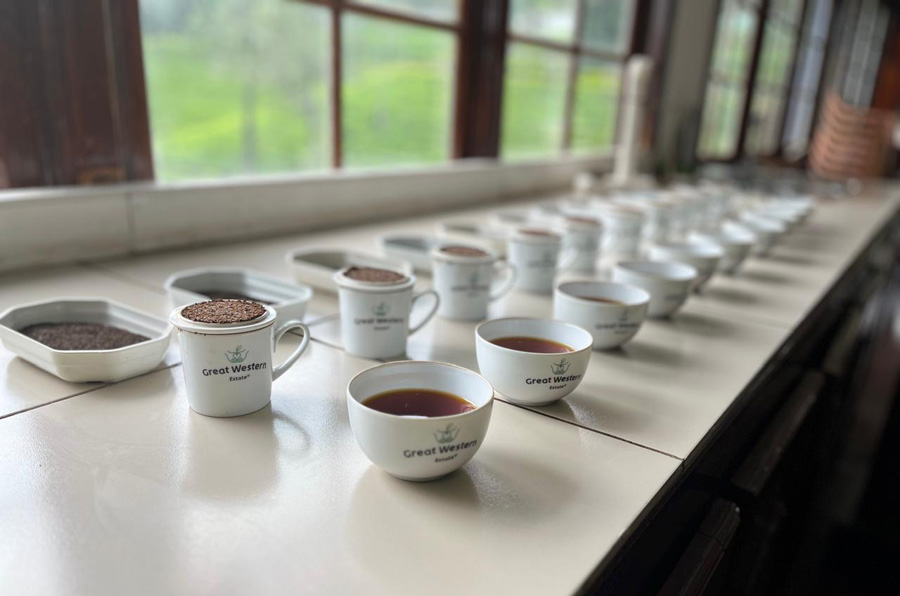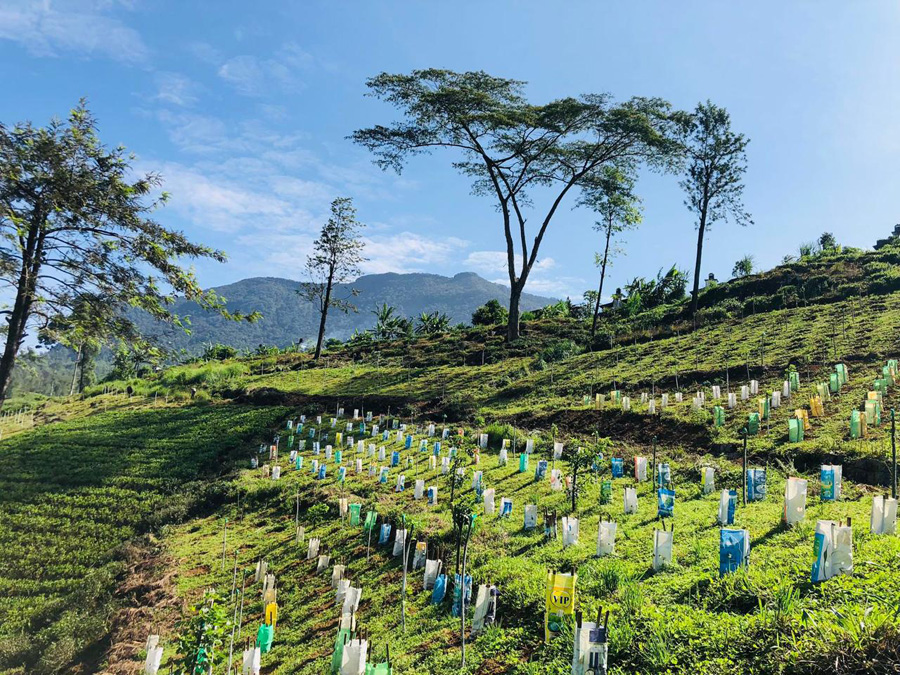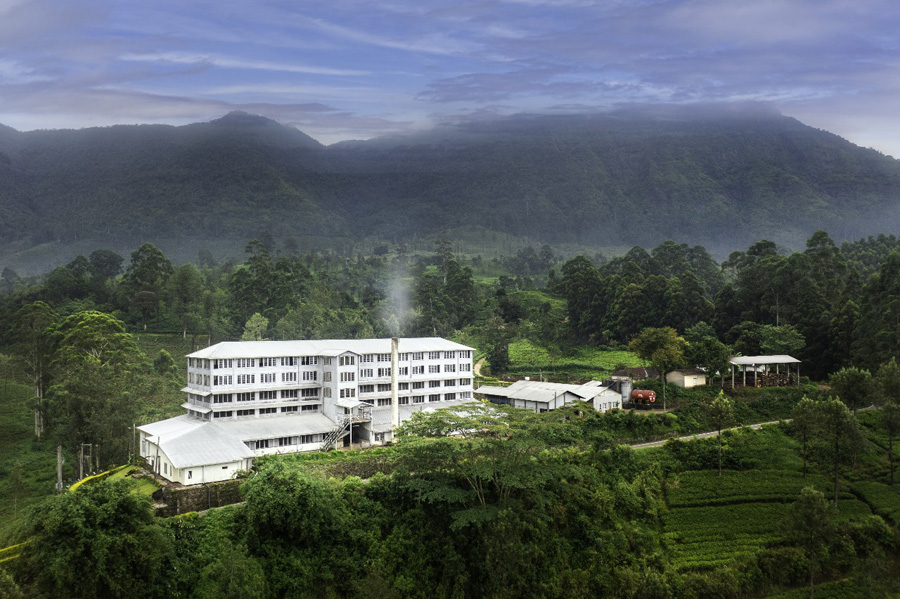Its story dates back to the 18th century, when British planter I.A. Rossiter first introduced coffee cultivation to the region in 1865.
Originally spanning across 628.48 hectares, the estate lies at an elevation of 1,448 meters and comprises four divisions, Great Western, Scalpa, Louisa and Galkandawatte.
After a period under the Dent Brothers & Co, the estate gradually transitioned from coffee to tea.
In 1893, with the construction of the nearby Great Western Railway Station, the estate was fully converted to tea cultivation under the ownership of the Great Western Tea Company of Ceylon Ltd.
The estate was taken over by the government in 1975 and placed under the Sri Lanka State Plantations Corporation until 1992, when it came under the stewardship of Talawakelle Tea Estates PLC, a member of the Hayleys Plantations group.
Today, it remains one of Sri Lanka’s most renowned tea estates.
Great Western has pioneered several firsts in the country’s plantation history.
It was the first estate to implement the 5S workplace management system and the first to obtain ISO 14001 certification in the food category.
Certified by the Rainforest Alliance, the estate maintains its commitment to sustainable and ethical agricultural practices.
Its elevation and cool climate create optimal conditions for cultivating tea of the highest quality.

Blending Tradition with Technology
What sets Great Western apart is its ability to blend tradition with innovation.
The estate continues to produce high-quality orthodox black tea, following traditional processes of plucking, withering, rolling and grading.
But alongside these time-honored methods, Great Western has embraced a new era of specialty teas, crafted from tea bushes over 150 years old and grown at elevations exceeding 5,000 feet.
These artisanal teas ranging from Silver Tips and Golden Tips to Blooming Tea and Dragon Balls are handpicked at dawn, sun-dried naturally and hand-crafted to perfection.
While they currently account for just 2–3% of total production, these innovative teas are steadily gaining popularity in international markets.
In the last season alone, they contributed over 2.2% of the estate’s total sales revenue which is a number expected to rise significantly.
Technological advancements are also reshaping field operations.
Digital weighing systems linked to mobile phones allow real-time monitoring of green leaf collection.
A centralized Productivity Monitoring System (PMS) ensures all managerial staff can access live data, allowing for faster and more informed decision-making.
Fertilizer application is now carried out by drones, increasing coverage and efficiency while addressing the current shortage of field workers.
These efforts have helped the estate maintain the highest Gross Sales Averages (GSA) in the Western High Grown category for three consecutive years in 2022, 2023 and 2024.
It also set record prices for Dust I (Rs. 2,900 in 2024) and BOP (Rs. 2,550 in 2022) under the CTTA rankings, strengthening its reputation as an industry leader.
Empowering People and Enriching Communities
Beyond its accolades and quality tea, Great Western Estate is an ecosystem of over 600 workers and their 1,260 families, representing a community of 4,380 people.
With monthly earnings averaging Rs. 50,000 per worker, the estate plays a vital role in supporting the livelihoods of thousands.
The innovative “Block Manager” system offers greater opportunities, allowing workers to manage individual plots with flexible hours.
Families involved in this model can earn over Rs. 100,000 a month, enhancing household incomes and promoting economic sustainability.
Welfare and recognition are key to the estate’s operations.
Workers benefit from a range of incentives, maternity payments, access to healthcare and even mid-day meals amounting to over Rs. 1 million annually.
Competitions and awards recognize outstanding performance, with one plucker, Iresha Rajaletchumy, winning a cash prize and gifts totaling over Rs. 1 million in 2025.
Great Western also invests in the next generation.
Children of estate workers who perform well in exams are supported by the MJF Charitable Foundation and given opportunities to join the estate’s staff.
Community members are encouraged to cultivate home gardens, rear poultry and run small businesses, strengthening local economic resilience.
Through a strong partnership with Berendina Development Services (BDS), the estate has launched skill development programs for youth, provided agricultural equipment, renovated roads and improved community infrastructure.
Estate-run cooperative shops and credit systems help workers access essential items and loans.
The estate’s commitment to environmental stewardship is evident in its agricultural practices.
Composting, rainwater harvesting, replanting tea and coffee and the use of green manure plants ensure soil health and sustainability.
Periodic pruning, proper drainage and fertilizer application based on soil analysis from the Tea Research Institute are part of a comprehensive sustainability strategy.
The estate has launched two ambitious projects which is a Glamping Site to attract eco-tourists and a Bio Tea initiative focused on producing chemical-free, organic tea.
These projects are designed to capitalize on emerging market trends while staying true to the estate’s environmental and community-centered values.
In every gram of tea, it produces Great Western Estate remains a symbol of excellence, resilience and progress, growing strong in the heart of Sri Lanka’s hill country.























